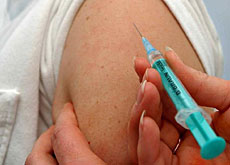Allergies thrive on too much hygiene

Swiss experts are warning that too much cleanliness can weaken the body's immune system and cause allergies to develop.
The new findings suggest that children in particular are failing to develop key defences against everyday bacteria.
As part of World Health Day on Monday, the World Health Organisation (WHO) is launching a new campaign, “Healthy environments for children”.
One of its goals is to investigate the reasons for a rise in allergies such as hay fever and asthma.
In Switzerland alone, cases of hay fever rose from 2 per cent of adults in 1920 to 13 per cent in 1991. At present, 15 per cent of children are affected.
Globally, one child in ten now suffers from asthma.
Excess hygiene
Swiss specialists have recently discovered that efforts to create a healthier environment with highly sanitised living spaces may actually be doing more harm than good.
Michel Hofer, an allergy and immunology specialist in canton Vaud’s University Hospital, says the higher levels of hygiene in the world’s most economically developed countries may be linked to the growth in allergies.
It is now believed that babies need exposure to certain viruses and bacteria in order for their bodies to develop defences against them.
Too much protection from such elements, says Hofer, means that children’s bodies cannot learn how to block infections.
As a result, immune systems can take relatively benign elements, such as dust or cat fur, to be dangerous foreign bodies, provoking bodily reactions, such as inflammations.
Friendly bacteria
According to research conducted by the Swiss child allergy research institute, Scarpol, between 1992 and 2000, bacteria from animals can also prevent allergies.
“The [Scarpol] study found that children living on farms and in contact with the animals developed fewer allergies than children living in the same village,” Christine Braun, a professor of social and preventative medicine at the Basel University, told swissinfo.
“After we compared these findings with similar studies elsewhere in Europe, we came to the conclusion that exposure to certain bacteria carried by animals created a form of protection.”
Children who have a large family or who frequent crèches may also have stronger immune systems, Braun says.
Future treatment
Health experts are currently working on effective treatments against allergies.
Philippe Eigenmann, a childhood allergy specialist at Geneva’s University Hospital, says the best cure may be to use bacteria to help the body fight off allergies.
“One of the most promising methods is to expose children to bacteria that influence their immune systems from an early age,” he says.
If successful, this treatment would force the body to find a way to protect itself from the foreign bodies. The use of antibodies could offer another way to prevent an allergic reaction, Eigenmann says.
Pollution not guilty
Recent scientific findings discredit previous claims that the rise in pollution was to blame for children’s weakening immune systems.
A major study carried out in Germany during the 1990s compared children from Munich with children from Leipzig, formerly in East Germany, for allergies.
The study found that, while the children in Leipzig were exposed to significantly higher levels of pollutants, they had fewer allergies than their counterparts in Munich.
However, allergies rose as Leipzig became more affluent, with the study concluding that financial development may be linked to a rise in allergies.
swissinfo, Vanda Janka (translation: Joanne Shields)
Allergies, such as hay fever and asthma, are on the increase.
Recent studies have linked increasing levels of hygiene to the rise in allergies, with children failing to develop their own defences against infection.
A potential preventative treatment may be to expose children to certain bacteria at an early age, to prompt their bodies to create defences.

In compliance with the JTI standards
More: SWI swissinfo.ch certified by the Journalism Trust Initiative










You can find an overview of ongoing debates with our journalists here . Please join us!
If you want to start a conversation about a topic raised in this article or want to report factual errors, email us at english@swissinfo.ch.